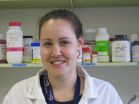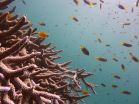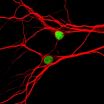Better detection, prevention, and pre-clinical treatment: 3 effective tools in the fight against Alzheimer's
Experts report on current strategies in the Journal of Alzheimer's Disease
2014-12-03
(Press-News.org) Amsterdam, The Netherlands, December 2, 2014 - Detection, prevention, and preclinical treatment are three key areas that may make a difference in the battle to reduce the rapid rise of new Alzheimer's disease (AD) cases every year. These three topics are the focus of an important new supplement to the Journal of Alzheimer's Disease.
Organized by Guest Editor Jack de la Torre, MD, PhD, Professor of Neuropsychology at The University of Texas at Austin, the supplement is a novel guide to how Alzheimer dementia may be approached and managed right now, not years from now. It includes 23 articles contributed by an international group of noted AD experts. "This issue will be of interest to established researchers and young investigators seeking a broader knowledge of the AD problem, as well as to clinicians who deal with elderly patients or with individuals who may show up at their clinics as outpatients showing signs of cognitive dysfunction," notes Dr. de la Torre.
Coverage of detection includes insightful reviews and discussions of techniques and strategies that seek ways to identify AD before it starts, such as risk factors to dementia, retinal pathology, cardiovascular disorders, neurocognitive testing, assorted brain markers, hemodynamic changes, and neuroimaging assorted brain lesions.
In the area of prevention, investigators explore how a multidisciplinary approach involving brain and heart specialists can better create a plan of intervention for patients at risk of AD or for people presenting preclinical signs of dementia. Additional reviews in prevention include risk assessments to dementia, lifestyle and cognitive counseling to maintain normal cognition, and established preventive techniques that can help delay AD onset.
The final topic centers on pre-clinical AD treatment. Contributions suggest how effective pre-clinical treatments of AD offer the hope of significantly lowering skyrocketing incidence while extending healthcare and quality of life.
While these treatments are still at the experimental stage, they may offer a departure from the failed attempts of amyloid-beta therapy. As an example, a team of researchers at the University of Texas at Austin led by Dr. Francisco Gonzalez-Lima have demonstrated that oral administration of methylene blue, a substance used since the 19th century to treat many medical disorders, lessens learning and memory loss in rats with a poor blood supply to the brain caused by chronic cerebral hypoperfusion. Chronic cerebral hypoperfusion in older people has been shown to be an important risk factor in Alzheimer's disease. Methylene blue appears to improve memory and learning in these animals by increasing mitochondrial energy activity in the brain. Mitochondrial energy dysfunction in the brain is not uncommon during advanced aging in the presence of disorders such as carotid occlusion, hypertension, brain trauma, diabetes, heart disease and stroke. Mitochondrial respiration leading to cognitive decline is also affected years before the onset of Alzheimer's disease in predisposed individuals. The results of this study suggests that daily oral administration of low dose methylene blue USP in elderly people at risk of Alzheimer's disease can be a useful treatment to prevent the start of memory decline or the beginning of Alzheimer's disease.
According to Dr de la Torre, "It seems an auspicious moment to open a dialogue between those pursuing a treatment for AD and those favoring prevention of this dementia. Such a dialogue could lead to a more effective course of action in confronting the needs of AD patients and those at risk of developing this disorder. The reviews contained in this supplementary issue of JAD may set the stage for such a discourse and in addition, provide some viable tracks on the road to discovering a realistic pathway for coping with this grim disorder."
INFORMATION:
ELSE PRESS RELEASES FROM THIS DATE:
2014-12-03
Scientists have released details of a raft of new chemicals with potent anti-malarial properties which could open the way to new drugs to fight the disease.
A new paper in PNAS is the third published by the group at the Australian National University (ANU), which has collaborated with groups from around the globe to uncover potential ammunition in the fight against malaria.
Over 200 million people contract malaria each year, and the parasite that causes the disease has become resistant to most of the drugs currently available.
"The papers show the malaria parasite ...
2014-12-03
A glimmer of hope for corals as baby reef builders cope with acidifying oceans
While the threat of coral bleaching as a result of climate change poses a serious risk to the future of coral reefs worldwide, new research has found that some baby corals may be able to cope with the negative effects of ocean acidification.
Ocean acidification, which is a direct consequence of increased atmospheric carbon dioxide levels, is expected to have a deleterious effect on many marine species over the next century.
An international team examining the impact of ocean acidification ...
2014-12-03
Coral reefs provide a range of benefits, such as food, opportunities for income and education, but not everyone has the same access to them, according to a new study conducted by the ARC Centre of Excellence for Coral Reef Studies (Coral CoE) at James Cook University.
The researchers examined how people from 28 fishing communities in Madagascar, Kenya, Tanzania and Seychelles benefit from the marine environment.
For many years conservation in developing countries has been based on the assumption that improvements in ecosystem conditions, such as increasing coral reef ...
2014-12-03
December 3, 2014 -- Individuals conceived in the severe Dutch Famine, also called the Hunger Winter, may have adjusted to this horrendous period of World War II by making adaptations to how active their DNA is. Genes involved in growth and development were differentially regulated, according to researchers at the Leiden University Medical Center, Harvard University, and Columbia University's Mailman School of Public Health. Findings are published in the journal Nature Communications.
During the winter of 1944-1945 the Western part of The Netherlands was struck by a severe ...
2014-12-03
CHAPEL HILL, NC - UNC School of Medicine researchers have found for the first time a biochemical mechanism that could be a cause of "chemo brain" - the neurological side effects such as memory loss, confusion, difficulty thinking, and trouble concentrating that many cancer patients experience while on chemotherapy to treat tumors in other parts of the body.
The research, published in the Proceedings of the National Academy of Sciences, shows how the common chemotherapy drug topotecan can drastically suppress the expression of Topoisomerase-1, a gene that triggers the ...
2014-12-03
Coffee, apple juice, and vitamin C: things that people ingest every day are experimental material for chemist Eva-Maria Felix. The doctoral student in the research group of Professor Wolfgang Ensinger in the Department of Material Analysis is working on making nanotubes of gold. She precipitates the precious metal from an aqueous solution onto a pretreated film with many tiny channels. The metal on the walls of the channels adopts the shape of nanotubes; the film is then dissolved. The technique itself is not new, but Felix has modified it: "The chemicals that are usually ...
2014-12-03
WASHINGTON, D.C., December 3, 2014--A new report from the American Institute of Physics (AIP) Statistical Research Center has found that the number of Hispanic students receiving bachelor's degrees in the physical sciences and engineering has increased over the last decade or so, passing 10,000 degrees per year for the first time in 2012. The overall number of U.S. students receiving degrees in those fields also increased over the same time, but it increased faster among Hispanics.
From 2002 to 2012, the number of Hispanics earning bachelor's degrees in the physical sciences ...
2014-12-03
TALLAHASSEE, Fla. -- A team led by Florida State University researchers has identified DNA elements in maize that could affect the expression of hundreds or thousands of genes.
"Maybe they are part of the machinery that allows an organism to turn hundreds of genes off or on," said Associate Professor of Biological Science Hank Bass.
Bass and Carson Andorf, a doctoral student in computer science at Iowa State University, began this exploration of the maize genome sequence along with colleagues from FSU, Iowa State and the University of Florida. They wanted to know ...
2014-12-03
New York, NY, December 2, 2014 - Immediate breast reconstruction following mastectomy is becoming more prevalent. However, in breast cancer patients undergoing simultaneous chemotherapy, thrombotic complications can arise that can delay or significantly modify reconstructive plans. Outcomes of cases illustrating potential complications are published in the current issue of Annals of Medicine and Surgery.
Chemotherapy is increasingly used to treat larger operable or advanced breast cancer prior to surgery. Chemotherapy delivered via the placement of a central venous line ...
2014-12-03
Hamilton, ON (Dec. 3, 2014) - Scientists at McMaster University have discovered that human stem cells made from adult donor cells "remember" where they came from and that's what they prefer to become again.
This means the type of cell obtained from an individual patient to make pluripotent stem cells, determines what can be best done with them. For example, to repair the lung of a patient with lung disease, it is best to start off with a lung cell to make the therapeutic stem cells to treat the disease, or a breast cell for the regeneration of tissue for breast cancer ...
LAST 30 PRESS RELEASES:
[Press-News.org] Better detection, prevention, and pre-clinical treatment: 3 effective tools in the fight against Alzheimer's
Experts report on current strategies in the Journal of Alzheimer's Disease




